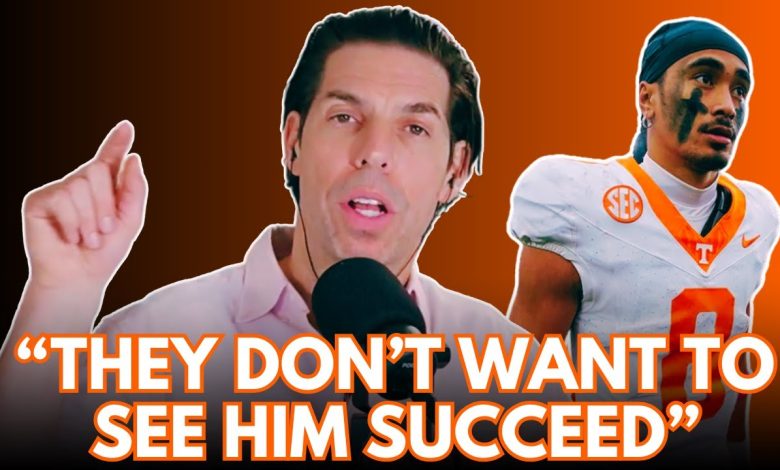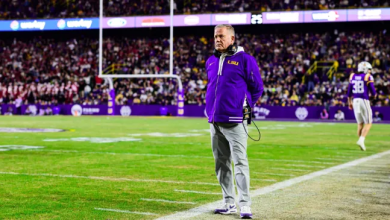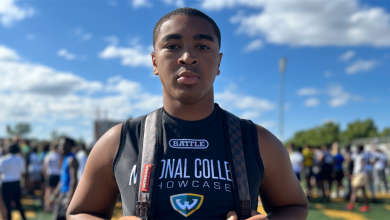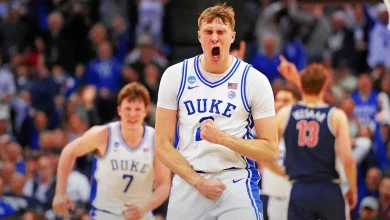Nico Iamaleava’s camp denies NIL demands played a role in his transfer, calling reports exaggerated and misleading about his exit.

As college football continues to evolve through the era of Name, Image, and Likeness (NIL), public perception and rumors are becoming nearly as influential as on-field performance. At the center of the latest wave of speculation stands Nico Iamaleava, the former five-star quarterback who recently entered the transfer portal. While reports initially suggested that NIL demands played a significant role in his departure from Tennessee, Iamaleava’s camp has publicly denied those claims, calling them exaggerated and misleading.
Their statement adds a new layer to a narrative that has unfolded quickly and dramatically in Knoxville, raising questions about the influence of media coverage, the pressure on young athletes, and the broader challenges within college football’s current landscape. In this piece, we’ll examine the background behind Iamaleava’s transfer, explore his camp’s response, and dig deeper into what this episode reveals about the state of modern college football.
Nico Iamaleava: A Five-Star Talent in the Spotlight
From the moment he committed to Tennessee, Nico Iamaleava was more than just a top recruit—he was a symbol of a new era for the Volunteers. Rated as one of the top quarterbacks in the 2023 class, Iamaleava brought with him national attention, high expectations, and a belief that he could be the cornerstone of a championship-contending program.
Standing 6’6” with a big arm, elite athleticism, and a natural feel for the game, Iamaleava was billed as the next great Tennessee quarterback—one who could carry on the legacy of Peyton Manning and Tee Martin. Tennessee invested heavily in him, both in terms of trust and, reportedly, NIL opportunities. Early buzz suggested he could be one of the highest-paid high school signees in the NIL era, though no official numbers were ever confirmed.
Yet, after just one season in Knoxville, the young quarterback has decided to transfer, catching many by surprise and prompting a wave of speculation about the true reasons behind the move.
The NIL Rumors and Media Backlash
As news broke of Iamaleava’s decision to enter the transfer portal, some media outlets and social media voices quickly pointed to NIL-related issues. Anonymous sources cited dissatisfaction with promised deals, disputes with Tennessee’s collectives, or even new financial demands ahead of his anticipated starting role in 2024.
These reports lit a firestorm across the college football world. Critics decried the growing influence of NIL, accusing young athletes of prioritizing money over loyalty. Fans expressed disappointment and frustration, especially those who had invested emotionally in Iamaleava’s future with the Vols. The narrative was fast-moving and unforgiving.
But according to Iamaleava’s camp, that narrative is flat-out wrong.
Nico’s Camp Responds: “This Wasn’t About Money”
In a statement released earlier this week, Iamaleava’s representatives pushed back on reports that NIL demands drove his decision. “There have been numerous inaccurate accounts surrounding Nico’s transfer,” the statement read. “At no point did Nico or anyone representing him make financial ultimatums or NIL-based demands to Tennessee. His decision was rooted in personal growth, football opportunity, and a desire to find the best fit moving forward.”
They went on to describe the media coverage as “irresponsible,” adding that the rumors not only mischaracterized Iamaleava’s intentions but also unfairly painted him as a mercenary rather than a committed athlete facing a difficult personal decision.
This pushback is important, not just for Iamaleava’s public image, but for what it says about the broader NIL landscape. When every transfer by a star player is automatically linked to money, it can obscure more nuanced reasons—coaching fit, development opportunities, offensive schemes, family matters, or personal well-being.
Understanding the True Reasons for Transfer
According to sources close to the situation, Iamaleava’s decision stemmed more from football-related concerns than financial ones. Tennessee’s offensive direction under head coach Josh Heupel had reportedly become a point of friction. Though known for a quarterback-friendly, up-tempo system, Heupel’s recent shifts in play-calling philosophy and staff structure may not have aligned with Iamaleava’s long-term development goals.
Additionally, internal competition and potential roster changes at the quarterback position may have played a role. While Iamaleava was widely expected to be the starter in 2024, competition from incoming transfers or rising underclassmen could have created uncertainty. Rather than gamble on internal politics, Iamaleava chose to explore new opportunities elsewhere.
The influence of family and advisors shouldn’t be overlooked either. As a high-profile quarterback with NFL aspirations, every snap and every season matters. The transfer decision may have been made with a simple goal: find the best place to succeed—on the field, in the locker room, and in the classroom.
The Weight of Expectations in the NIL Era
What’s become increasingly clear is that the pressure on top-tier recruits like Iamaleava has never been higher. Between media hype, fan expectations, and financial speculation, the margin for error is razor-thin. One underwhelming game, one coaching misalignment, or even a change in support staff can trigger a storm of criticism or, as in this case, a player’s exit.
In many ways, Iamaleava became a lightning rod for the broader NIL debate. Even before he played meaningful snaps, he was reportedly a millionaire. Whether or not that was true, it shaped how people viewed him. Every move was seen through the lens of money rather than maturity or football fit.
That’s a problem—not just for Nico, but for every young athlete navigating this space. The NIL era has created incredible opportunities for players to benefit from their talents, but it’s also created an environment ripe for misunderstanding and misjudgment. Athletes become symbols rather than individuals, and their choices get reduced to dollar signs.
What’s Next for Iamaleava?
As Iamaleava evaluates his next destination, programs across the country are lining up. Schools with quarterback needs, NFL-caliber development programs, and strong NIL infrastructure will all be in play. And wherever he lands, he’ll be expected to compete immediately for a starting role.
More importantly, he’ll also be looking to reshape his narrative—not as a player chasing a check, but as a dedicated, dynamic quarterback looking for the right place to thrive.
There’s still every reason to believe Iamaleava can be an elite college quarterback. He’s got the physical tools, the pedigree, and the work ethic. His next chapter could be even more impressive than what was originally imagined at Tennessee.
Tennessee’s Challenge: Rebuilding and Reframing
Meanwhile, Tennessee is left to regroup. Losing a five-star quarterback who had been viewed as the future of the program is a blow. The Volunteers must now assess their quarterback room, address internal concerns, and reestablish a clear identity moving forward.
This episode could serve as a learning moment for the program: communication with athletes and clarity around NIL expectations are now as vital as strength training and playbooks. Programs can no longer afford to assume loyalty based on commitment alone. Support, structure, and transparency are critical.
Final Thoughts: Facts Over Rumors
In the wake of Iamaleava’s departure, the rush to judgment reveals a deeper flaw in how college football stories are consumed and shaped. The media speculation, fueled by unnamed sources and click-driven narratives, created a storyline that—according to Iamaleava’s own team—had little basis in fact.
The truth, as always, is more complex. Transfers happen for all kinds of reasons. Sometimes, it’s about money. But more often, it’s about fit, future, and finding the right path. We owe it to these young athletes to seek the full picture, rather than the most sensational one.
Nico Iamaleava may have changed schools, but he hasn’t changed his goals: to be a leader, to grow as a quarterback, and to compete at the highest level. Wherever he lands next, it’ll be a fresh opportunity—and hopefully, a place where his story can be written on the field, not in headlines.









